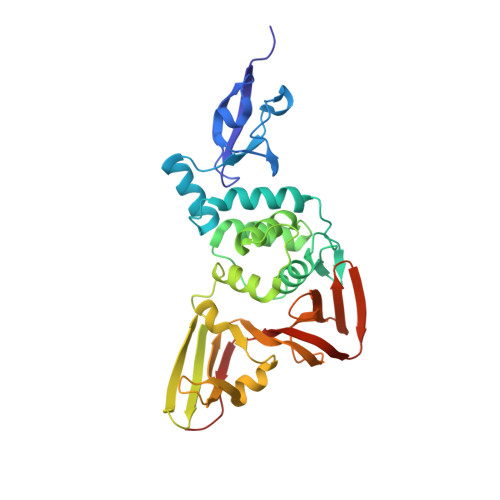Disulfiram can inhibit MERS and SARS coronavirus papain-like proteases via different modes
Lin, M.H., Moses, D.C., Hsieh, C.H., Cheng, S.C., Chen, Y.H., Sun, C.Y., Chou, C.Y.(2017) Antiviral Res 150: 155-163
- PubMed: 29289665
- DOI: https://doi.org/10.1016/j.antiviral.2017.12.015
- Primary Citation of Related Structures:
5Y3E, 5Y3Q - PubMed Abstract:
Severe acute respiratory syndrome coronavirus (SARS-CoV) emerged in southern China in late 2002 and caused a global outbreak with a fatality rate around 10% in 2003. Ten years later, a second highly pathogenic human CoV, MERS-CoV, emerged in the Middle East and has spread to other countries in Europe, North Africa, North America and Asia. As of November 2017, MERS-CoV had infected at least 2102 people with a fatality rate of about 35% globally, and hence there is an urgent need to identify antiviral drugs that are active against MERS-CoV. Here we show that a clinically available alcohol-aversive drug, disulfiram, can inhibit the papain-like proteases (PL pro s) of MERS-CoV and SARS-CoV. Our findings suggest that disulfiram acts as an allosteric inhibitor of MERS-CoV PL pro but as a competitive (or mixed) inhibitor of SARS-CoV PL pro . The phenomenon of slow-binding inhibition and the irrecoverability of enzyme activity after removing unbound disulfiram indicate covalent inactivation of SARS-CoV PL pro by disulfiram, while synergistic inhibition of MERS-CoV PL pro by disulfiram and 6-thioguanine or mycophenolic acid implies the potential for combination treatments using these three clinically available drugs.
Organizational Affiliation:
Department of Life Sciences and Institute of Genome Sciences, National Yang-Ming University, Taipei 112, Taiwan.

















